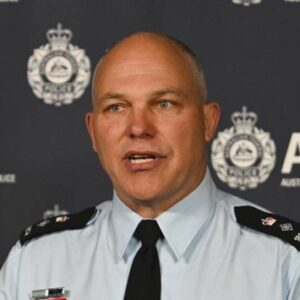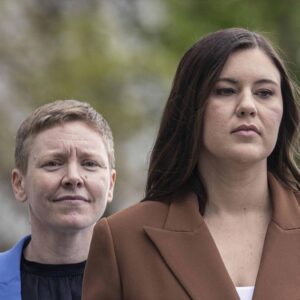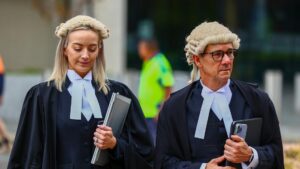The Australian 22May2023 Brittany Higgins ‘had to do media as face of #MeToo movement’ despite Lehrmann rape trial | The Australian
Brittany Higgins ‘had to do media as face of #MeToo movement’: Victims advocate told cop

- EXCLUSIVE
COLUMNIST
and STEPHEN RICE
NSW EDITOR
- UPDATED 6:45AM MAY 22, 2023, FIRST PUBLISHED AT 10:30PM MAY 21, 2023
A senior police officer says when he asked that Brittany Higgins stop doing media that could prejudice Bruce Lehrmann’s rape trial, Victims of Crime Commissioner Heidi Yates told him: “She can’t, Scott – she is the face of the movement now.”
In a submission to the Sofronoff inquiry, Detective Superintendent Scott Moller says Ms Yates was “more interested in Ms Higgins pushing the ‘#metoo’ movement than being committed to the upcoming trial”.
“This upset me and I remember being mad that the Victims of Crime Commissioner was using the investigation as a voice for reform before the trial had even been conducted,” he says.
Superintendent Moller compiled the investigative review document, informally called the Moller report, that has become a key focus of the Sofronoff inquiry, which is probing the conduct of chief prosecutor Shane Drumgold in withholding it from Mr Lehrmann’s defence team.
In his 50-page statement to the inquiry, Superintendent Moller says that when he created the Moller report, it was an internal decision-making document; it was “never my intention” for the document to go to the DPP for legal advice, as the DPP has claimed, he says.
Superintendent Moller, who has been a police officer for more than 30 years, is expected to give evidence to the inquiry on Monday. Led by Walter Sofronoff KC, the inquiry is also examining the conduct of police and Ms Yates, who became a highly visible presence during the trial, often seen accompanying Ms Higgins to court. Earlier in the case, Ms Higgins had asked for any contact by police to be made through Ms Yates, a move that Superintendent Moller says caused serious problems for investigators.

Superintendent Scott Moller. Picture: Supplied
READ MORE: Drumgold CCTV claim ‘vexatious’ | Thank God for Wilkinson’s speech: Lehrmann lawyer | Presumption of innocence a ‘human right’ | ‘Verdict first, trial later’: rule of law under threat | Did DPP succumb to #MeToo zealotry?
“I personally found her involvement frustrating and cumbersome, and she made it difficult for ACT Police to contact the victim,” he says.
Superintendent Moller says Ms Yates’ participation in the investigation was inappropriate and added additional stress and anxiety to the investigation team.
He felt Ms Yates was attempting to place a barrier between investigators and Ms Higgins.
Superintendent Moller says he could not understand why the head of the organisation was acting as “support person” to an alleged victim of a sexual assault.
“The VCC acting personally in a support/conduit role complicated the investigation and was always highly inappropriate,” he says.
“I felt one of the more upsetting aspects of her involvement was her lack of involvement in other sexual assault matters that were progressing through the courts at the same time.”
Superintendent Moller says there was “significant external and internal pressure” to erode the threshold for charging a person with a sexual offence, and to erode investigators’ “independent and objective search for the truth”.

“It appears to me this is in response to public discourse about the treatment of survivors in the criminal justice system,” he says.
As an example, he cites a recent ACT government report by the Sexual Assault Prevention and Response Steering Committee that records one of its aims as “to ensure victims survivors know that when they disclose sexual violence they will be believed”.
“This is fundamentally at odds with the investigative function of police and the purpose of the criminal justice system (judiciary and juries),” Superintendent Moller says in his submission.
“We as police are the first ‘filter’ to ensuring the integrity of the criminal justice system. The judiciary and the community require and expect police to critically assess all available information and evidence in determining if the threshold to charge has been met.”
Superintendent Moller says he received reports that when DPP prosecutor Skye Jerome held training sessions for AFP officers, Ms Jerome “was dismissive and condescending of the investigators and that many of the investigators were offended by the way she had presented”.
“Additionally, I was informed she has stated that in sexual assault investigations, ‘an evidence-in-chief-interview and statement of complaint is sufficient to go ahead … because police are not the finder of facts’. These comments astounded me.”

Superintendent Moller says he was briefed on a meeting between police and DPP members at which Ms Jerome had advised, during an open discussion about the evidence, that prosecutions would not be progressed when victims did not hand over their mobile telephone.
“The investigators advised that Ms Higgins had not handed her phone over,” he says. “On hearing this information, I was briefed that Skye Jerome dropped her head into her hands in what appeared to be frustration and alarm.
“After these meetings I was concerned for the independence and integrity of the investigation.”
Superintendent Moller became aware that an investigation into Ms Higgins’ complaints had recommenced in February 2021, after she had previously declined to proceed with a complaint.
“The significant aspects of that briefing for me was that Ms Higgins was not willing to provide a formal statement at that time and wanted to delay providing the statement until after a news article by journalist, Samantha Maiden had been published and that she had already participated in an interview with Lisa Wilkinson which was to be aired on The Project,” he says.
“I did not understand why Ms Higgins had chosen to involve the media prior to providing police with a formal statement, however my briefing articulated that Ms Higgins wanted to ensure the investigation was ‘active’ to support the media releases. This had me immediately suspicious and questioning the motives of Ms Higgins for reporting the incident.”
| THEAUSTRALIAN.COM.AU07:46
EXCLUSIVE: Steven Whybrow SC on the trial of Bruce Lehrmann |
Bruce Lehrmann’s defence barrister says if he were ever to write a book about the trial, he would call it…
This strategy by Ms Higgins “significantly hindered the investigation” as it was extremely difficult for investigators to progress the investigation without a statement of complaint, he says.
In his statement, Superintendent Moller says that when he met with Mr Drumgold on June 1 2021 – three weeks before the DPP received the brief of evidence on June 21 – “it was clear to me that he had already decided on progressing the prosecution even though he had not reviewed the evidence.”
During this conversation, Superintendent Moller claims Mr Drumgold said: “I don’t have to prove sex occurred” because, according to Mr Drumgold, Ms Higgins’s state of undress, when she was found, corroborated that sex took place.
“I expressed the concerns I had for Ms Higgins’ psychological health, the concerns we as investigators had with the evidence and the compounding pressure and issues associated with continual media reporting,” Superintendent Moller says.
“Mr Drumgold was dismissive of our concerns and then directed the conversation to the threshold for police to seek DPP advice. I felt Mr Drumgold was highlighting that police only required reasonable suspicion to lay a charge and the DPP would decide and advise on whether there was a reasonable prospect of conviction. He was very eager for the matter to be referred to him.”
On June 17, 2021, Superintendent Moller and Detective Inspector Marcus Boorman met Deputy Chief Police Officer Michael Chew about his direction to forward the brief of evidence to the DPP for advice.
Superintendent Moller informed Mr Chew that he “thought there was insufficient evidence to proceed”.
Diary notes of that meeting, in which Mr Chew was alleged to have said “there is too much political interference” not to proceed, were first revealed by The Australian in December.
In his statement to the inquiry, Superintendent Moller says those were the words used by Mr Chew and that he had responded: “That’s disappointing given I think there is insufficient evidence.”
Superintendent Moller says the investigating team were uncomfortable about Mr Drumgold’s advice to proceed with charges.
| THEAUSTRALIAN.COM.AU02:34
‘#Metoo has metastasised’ |
Steven Whybrow SC discusses the impact of media coverage on the judicial system and the rule of law.
Police were also concerned about Mr Drumgold’s relationship with prominent media figures including news.com.au political editor Samantha Maiden, who first broke the story of the rape allegations by Ms Higgins.
“It did make me feel uncomfortable when the evidence revealed Mr Drumgold was communicating with journalist Samantha Maiden during the investigation and well prior to trial,” Superintendent Moller says.
He says he felt during the entire investigation that Mr Drumgold “was not collegiate and was attempting to collect information on myself and the investigation members with the intention of criticising the AFP and the investigation team to deflect any criticism away from him and his office”.
“This added a significant burden to the investigation team and a feeling of complete isolation which I have never experienced previously,” he says.
Superintendent Moller also rejects claims made to the inquiry by Mr Drumgold that investigators were overly friendly with the defence team during the trial, and that there were “at least three occasions” when he saw the defence team “stand in a circle” that included AFP officers.
He says that on the day he attended the trial with three other officers “I noticed that the DPP seemed to be ignoring the police”.
“ I felt like they did not want anything to do with us which in my experience was highly unusual,” he says.

COLUMNIST
Janet Albrechtsen is an opinion columnist with The Australian. She has worked as a solicitor in commercial law, and attained a Doctorate of Juridical Studies from the University of Sydney. She has written for numer… Read more

NSW EDITOR
Stephen Rice started his newspaper career at The Sydney Morning Herald before moving into television, where he became executive producer of Nine’s Business Sunday programs. He has worked as a senior investigative p… Read more
Share this article
Related stories
- Drumgold CCTV claim ‘vexatious’
- Thank God for Wilkinson’s speech: Lehrmann lawyer
- Presumption of innocence a ‘human right’

